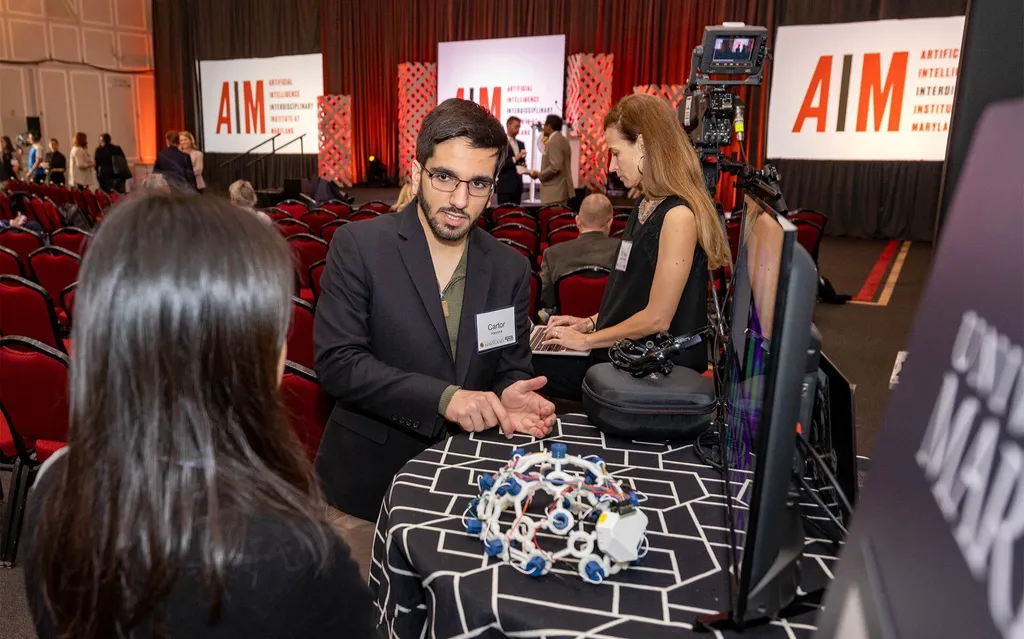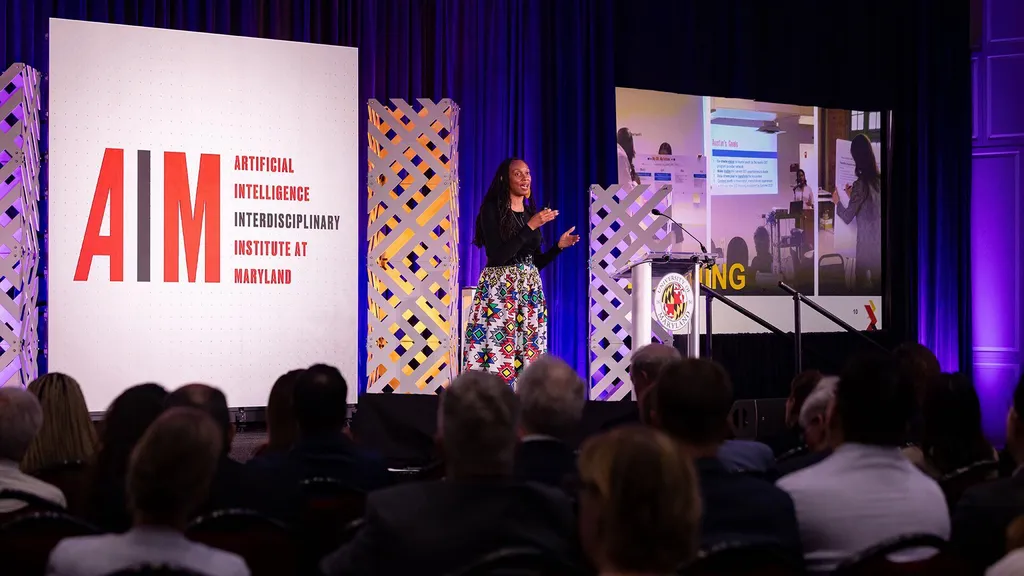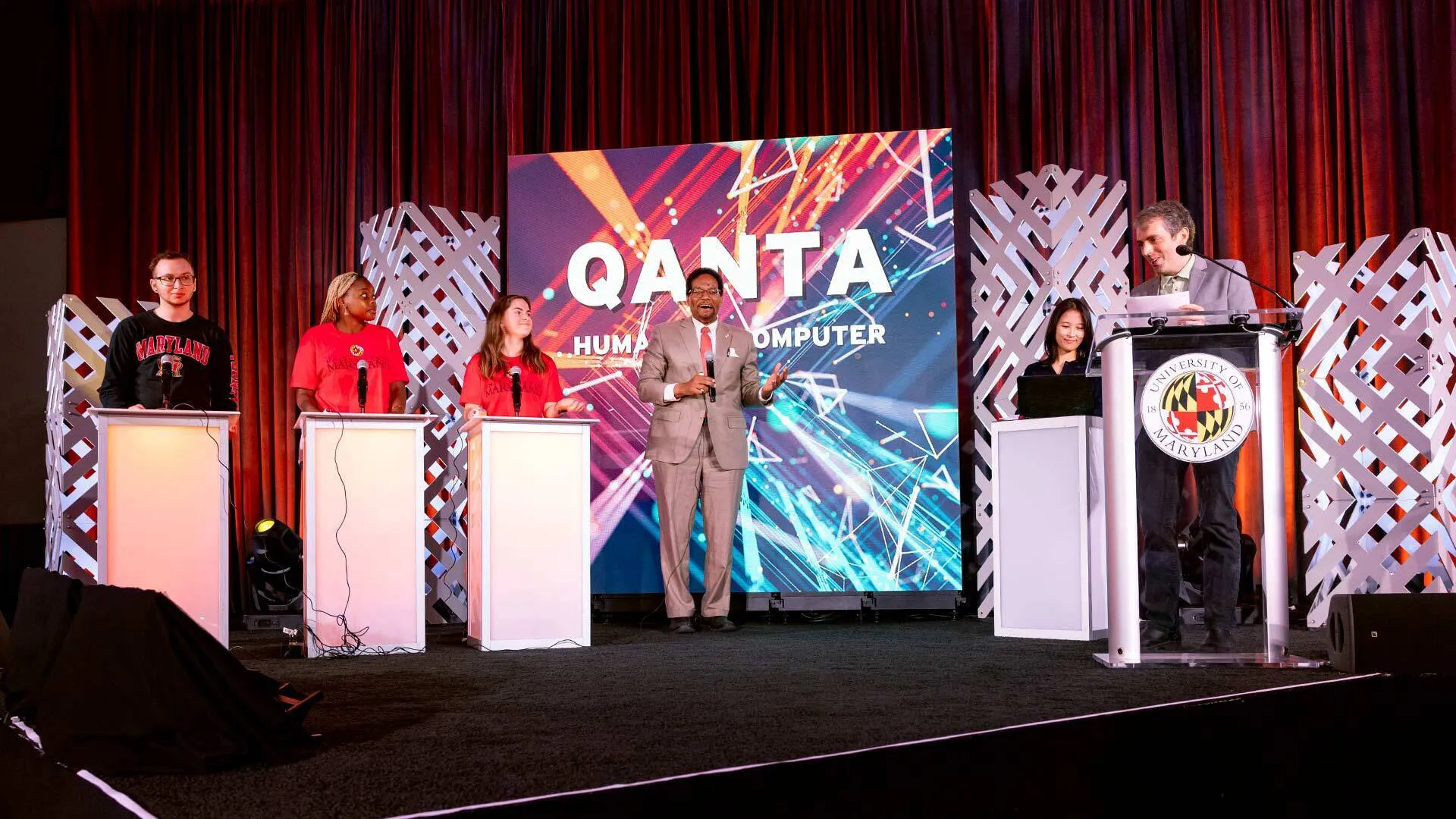- May 02, 2024
- By Maryland Today Staff
The University of Maryland on Thursday celebrated the launch of an institute to engage every academic unit across campus in creating the future of artificial intelligence, one in which the burgeoning technology works for the good of all.
Announced last month, the Artificial Intelligence Interdisciplinary Institute at Maryland (AIM) will be a collaborative hub for AI to support faculty research, offer innovative and experiential learning opportunities to boost the AI workforce and inspire new generations of leaders, and forge partnerships to focus on responsible and ethical AI throughout society.

The event at the Samuel Riggs IV Alumni Center featured remarks from AI experts and UMD leaders as well as “TED”-style talks from AIM principals; it also showcased AI-enabled projects from faculty, students and staff—from ways to make brain scans faster and more accessible to a new chatbot to help UMD students in their classes.
AIM’s director, Volpi-Cupal Family Endowed Professor Hal Daumé III, told the audience of hundreds of faculty, staff and students that the new institute will combine experts on the inner workings of technology with scholars from other fields who have deep insight into the world’s most pressing issues.
“I'm a computer scientist … it's definitely something I can't do on my own,” said Daumé. “Questions of human values and societal values are questions that humanists and sociologists have been studying for decades, if not longer. And so putting interdisciplinary (in the institute name) means that everyone can contribute on an equal playing field to answering these really pressing questions.”
UMD President Darryll J. Pines, who has designed AI-enabled systems as an engineer, related the perils of deploying the technology in ways that disregard basic standards of fairness and ethics. He related how a university community member last year told him about her son’s difficulty establishing a bank account overseas. The bank’s AI system, he explained, hadn’t been developed with data allowing it to identify images of some racial and ethnic groups—an indictment not of AI itself, but of decisions about its deployment.
“We must remember that at its core, AI is just a technological tool—like the radio, the television, like the calculator, like the smartphone you have in your pocket—and it will be up to humans to decide when, how and for what purpose it is used, and how many of our own biases and prejudices it inherits,” Pines said.
Senior Vice President and Provost Jennifer King Rice called Thursday a milestone for computer science at UMD. She reminded the audience that AI is hardly new; UMD has been helping to advance the field since the founding more than a half-century ago of what was then the Computer Science Center.
The technology that spread from those early investigations has moved beyond the department, and is powering research ranging from creating better math instruction to developing safeguards for our food supplies, she said.

“We know that a blend of science and technology remains at the core of artificial intelligence, and we also know that the role of AI is rapidly changing and evolving—affecting every area of study, every field and industry, and, it seems, almost every facet of our lives,” Rice said.
Much of the discussion of AI and its resulting tech has focused on replacing jobs thought to be simple, dull and requiring little creativity, said Professor Neda Atanasoski, AIM’s associate director for education and chair of the Harriet Tubman Department of Women, Gender and Sexuality Studies.
While that might sound like a good thing, a closer look shows service work is often highly skilled and requires creative problem solving, she said, and that such discussions tend to be about erasing the work of women, people of color and those from the Global South. A new conversation is needed, Atanasoski said.
“How can we get our students to think about how AI can increase access to a living wage, education or health care?” she said. “AIM promises to be a unique place for looking at AI in new ways, including applying feminist methods of scholarship to look at how AI is made and what it’s used for.”
UMD is blessed with brilliant technologists, but has also wisely included more than just them in AIM, said Sheena Erete, the institute’s associate director for research and associate professor in the College of Information Studies who works with marginalized communities to create technological approaches to problems.
“It's really important that we think broadly about everyone who these tools impact. Then that leads us to this question, which is: Who's at the table?” she said. “And I believe that every department on this campus has something useful to bring to this conversation that we have about AI.”

